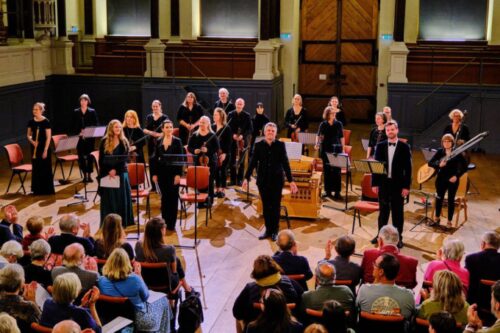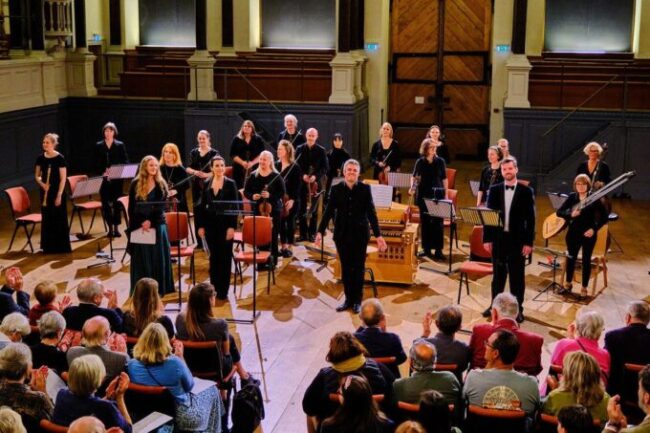 United Kingdom Handel, Aci, Galatea e Polifemo: Soloists, Instruments of Time and Truth / Christopher Bucknall (conductor). Sheldonian Theatre, Oxford, 22.9.2022. (CR)
United Kingdom Handel, Aci, Galatea e Polifemo: Soloists, Instruments of Time and Truth / Christopher Bucknall (conductor). Sheldonian Theatre, Oxford, 22.9.2022. (CR)

Cast:
Aci – Anna Devin
Galatea – Bethany Horak-Hallett
Polifemo – Edward Grint
Handel’s serenata from 1708, written for an aristocratic Neapolitan wedding during his extended trip to Italy, treats the same myth about Acis and Galatea (found in Ovid) as his more famous English masque, written in London a decade afterwards. But it is an entirely different work in terms of both its text and music, structured essentially as a small-scale opera with its typical Baroque form of alternating recitatives and stylised, virtuosic arias. Although for some that results in a dramatically incoherent whole with insufficiently developed characters, paradoxically in this work the figure of the cyclops Polifemo emerges as a more rounded and complicated figure than the Polyphemus of Acis and Galatea. Where he appears in the latter, more briefly, as an oafish, ungainly monster – virtually a caricature – in the earlier serenata he is presented as a more multi-faceted personality, engaging in more extended and discursive dialogue with the lovers whose happiness he intends to disrupt. This is very much a dynamic composition of three musical equals, therefore, rather than a pastoral idyll for just a pair, with occasional interventions from other characters.
Instruments of Time and Truth gave a vivid, vigorous account of the score under Christopher Bucknall’s direction from the harpsichord, generally brisk but not unduly rushed. The arias tended to be robustly performed with solid textures from the strings, creating drama more by such force and enthusiasm than wide variation or contrast in dynamic, tempo or articulation, but generally given impetus by the prominent sounds of the chitarrone and rhythmic fervour from the harpsichord. Timbral variety was certainly provided by Rachel Chaplin’s characterful playing on the oboe for a majority of the numbers, Kate Latham’s playfully coy recorder solo for ‘S’agita in mezzo’ and shining contributions from the pair of trumpets. As the score lacks an overture, Bucknall prefaced the performance with Handel’s Concerto Grosso Op.3 No.2, spotlighting two solo cellos in the mournful slow movement.
Anna Devin sang with crisp lustre, neatly bringing the coloratura of Aci’s music under control, and often melding with the oboe in striking euphony as their lines ran parallel to each other. Her well sustained melody for ‘Dell’aquila l’artigli’, accompanied only by a busy harpsichord part, showed her to be versatile and adaptable to other textures and moods. Bethany Horak-Hallett was mellower in tone for Galatea’s slightly lower tessitura, evincing similar steadiness and affection as Devin, though slightly submerged in the richer sonority of the orchestra in more fully scored numbers. But otherwise, she and Devin cohered persuasively – even if diction was not always absolutely clear – not least in the Trio ‘Dolce amico amplesso’ near the end of the work where their last, amorous suspensions in the music fused yearningly, provoking Polifemo to his recitative interjections before he finally commits his murderous deed.
Edward Grint was in supple voice as the giant Polifemo, rather than simply growling or barking out the notes, but shifting seamlessly between the widely different registers that Handel’s music calls for, not least in the fiendish two octave leaps of the famous ‘Fra l’ombre’. His mellifluous upper range, combined with a fluent, resonant, but even also graceful, descent to lower passages enabled him to press Polifemo’s suit cogently and sympathetically, not just as a mere ogre. But the sense of the character’s hulking demeanour was aptly conveyed in the hurled lines of his opening aria ‘Sibilar l’angui d’Aletto’ where it hardly seemed to matter that not every syllable or note was distinctly articulated, alongside the vicious-sounding strumming of chittarone and harpsichord. In short, this was a bold reading of the serenata overall, but which yielded plenty of human interest too.
Curtis Rogers
